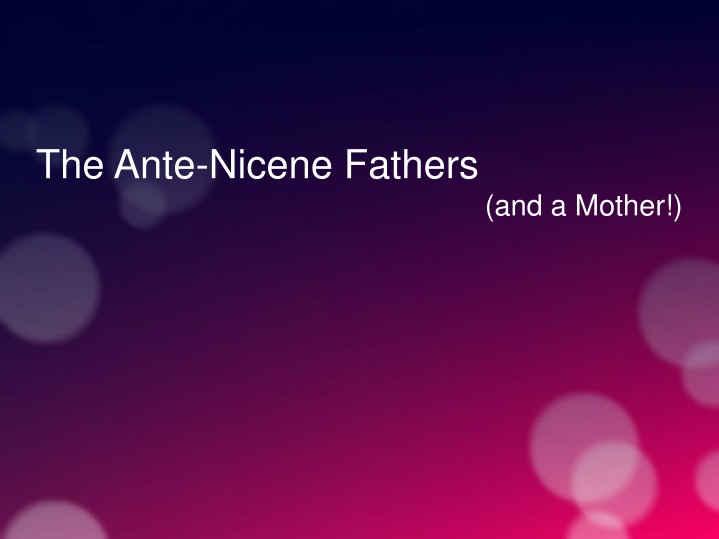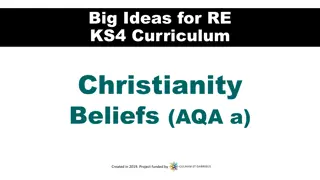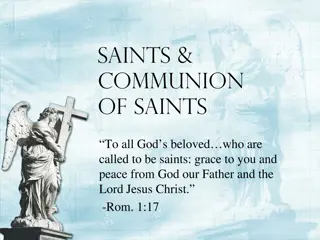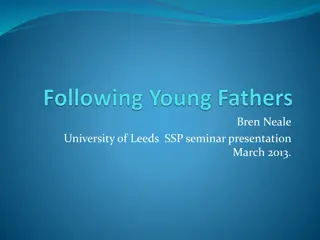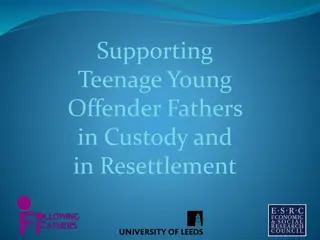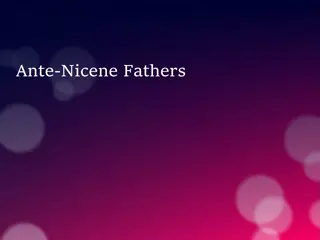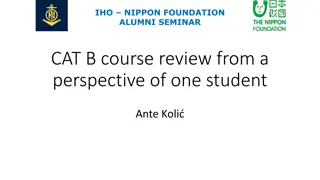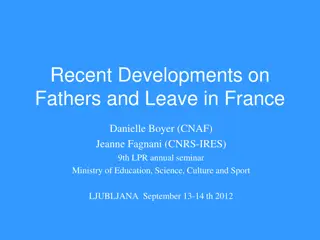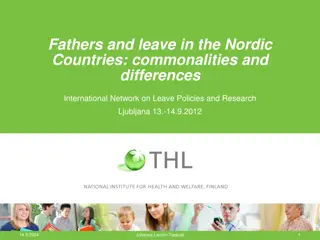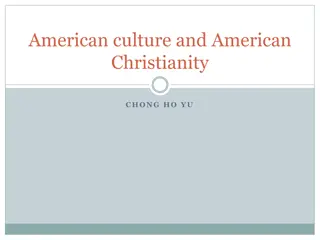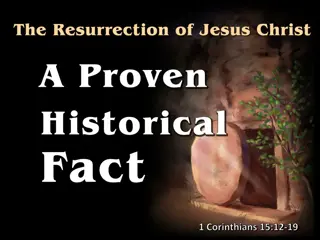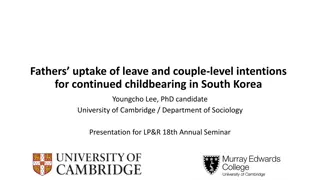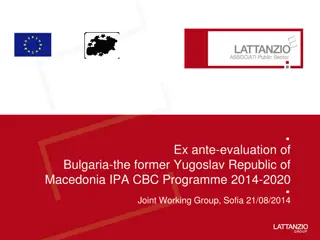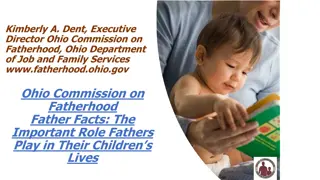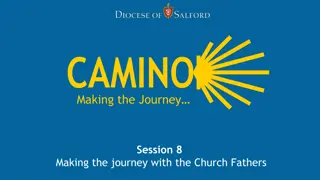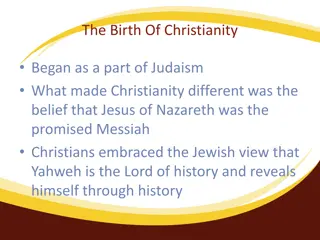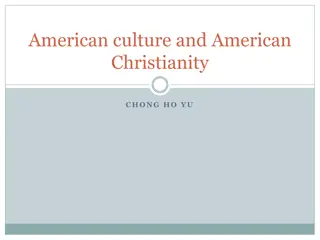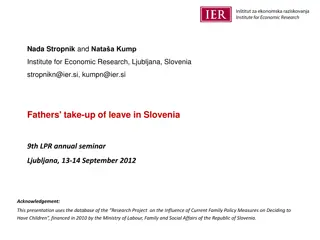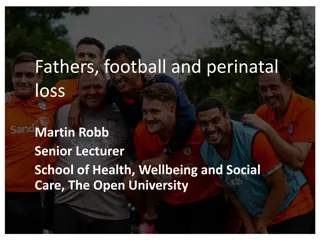Insights from the Ante-Nicene Fathers and Saints of Christianity
Remember the teachings and actions of the Patristic Fathers towards unity, martyrdom, and confronting heresies. Learn about key figures like St. Justin Martyr and the challenges they faced while defending orthodox Christian doctrine. Explore their contributions to the development of early Christianity amidst persecutions and divisions.
Download Presentation

Please find below an Image/Link to download the presentation.
The content on the website is provided AS IS for your information and personal use only. It may not be sold, licensed, or shared on other websites without obtaining consent from the author.If you encounter any issues during the download, it is possible that the publisher has removed the file from their server.
You are allowed to download the files provided on this website for personal or commercial use, subject to the condition that they are used lawfully. All files are the property of their respective owners.
The content on the website is provided AS IS for your information and personal use only. It may not be sold, licensed, or shared on other websites without obtaining consent from the author.
E N D
Presentation Transcript
The Ante-Nicene Fathers (and a Mother!)
What do we remember from the Patristic Fathers? Friends and students of the Apostles Longing to unite with Christ in suffering/martyrdom Christian Identity Broadness of the Church culturally open to Jew, Greek, free, slave, women, men Developing a more defined structure for unity
What do we remember from the Patristic Fathers? Persecutions by the Roman government are increasing Schisms and divisions Heresies spreading and proliferating Judaizing Gnosticism
2nd/3rd c. Christianity Confronting Heresies Evangelizing Maintaining Unity Responding to Persecutions
Saints of Week Three St. Justin Martyr St. Irenaeus of Lyons St. Cyprian of Carthage St. Clement of Alexandria St. Helena
St. Justin Martyr One of the first apologists Rational demonstration of superiority of orthodox Christian doctrine to the errors of infidels and heretics. Rigid obedience to Christian morals and Theological teaching How will world accept the faith if we can t prove it and willing to die for it? Former: Samaritan, Stoic, Peripatetic, Pythagorean, Platonist, etc. Converted by an old man near a beach who taught him the only truth would be found in the Prophets Three works defending Christianity: Letters to the emperor/senate A dialogue with Trypho the Jew
St. Justin Martyr Mass And this food is called among us [the Eucharist], of which no one is allowed to partake but the man who believes that the things which we teach are true, and who has been washed with the washing that is for the remission of sins, and unto regeneration, and who is so living as Christ has enjoined. ~1st Apology, 66 Chapters 65-67 detail the Mass start to finish the same structure we follow today. Defense against athiesm and impiety: Hence are we called atheists. And we confess that we are atheists, so far as gods of this sort are concerned, but not with respect to the most true God, the Father of righteousness and temperance and the other virtues, who is free from all impurity.
What is Gnosticsm? https://www.youtube.com/watch?v=f281VnRtcns
St. Irenaeus of Lyons Key points: Student of Polycarp, influenced by St. John, Bishop of Lyons (Gaul, France) He was an intellectual power house. He played key role in developing theology as science: Systematic Theology Fearless fighter against Gnostic errors(Gnosticism: goodness of creation; divinity of Christ) Eucharist Brings us in communion with God, bread of Immortality-spirit of the Father
St. Irenaeus of Lyons Key points: Scriptural canon: the first to list the four Gospels Mariology: Promoted Marian devotion: Second Eve, obedient to God, Human race had fallen into death bondage Ecclesiology: The Church has great role in the world- calls it paradise in the world Primacy of the Church of Rome: Unity through the Church of Rome Soteriology: Christ undoing the original through the tree of the cross. Original Sin: Disobedience with severe consequence
St. Irenaeus of Lyons Prolific writer, most famous for Against Heresies Nor, if He wasn t what He seemed to be, was there any measure of truth in Him. And thus, as the human race fell into bondage to death by means of a virgin, so is it rescued by a virgin; virginal disobedience having been balanced in the opposite scale by virginal obedience. For in the same way the sin of the first created man (protoplasti) receives amendment by the correction of the First-begotten, and the coming of the serpent is conquered by the harmlessness of the dove, those bonds being unloosed by which we had been fast bound to death. ~Bk V, Ch 19
For Discussion How do we understand conversion? What do we do about the Feel good syndrome that tolerates grave errors? Are Christians converting the world or vice versa? Where do we see Gnosticism today?
St. Cyprian of Carthage He came from a rich pagan in Africa. He received secular education; Philosophy and rhetoric, helped many through arguments in courts. He earned good money that was spent in lavish banquets. This kind of life did not quench his thirst for truth. Tertullian: Influenced greatly him with his apologetics, was led to the truth of Christianity. Baptism: Called it a second rebirth that opened new reality, a whole new life. He lived a Christ-like life that impressed, led to him being ordained deacon, later, priest and eventually ordained Bishop
St. Cyprian of Carthage Legacy: Unity of Christ and His Church, fought against schematics that sought to destroy the unity of the Church. He was a proponent of welcoming prodigal children of the Church-lapsi after true repentance ( Pope Francis??) If God is the Father, the Church is the Mother, the Bride of Christ Faith: Steadfast, embodiment of true piety and holiness, died a martyr on September 14, 258 Feast day Sept. 16
St. Cyprian of Carthage On Unity: And does any one believe that this unity which thus comes from the divine strength and coheres in celestial sacraments, can be divided in the Church, and can be separated by the parting asunder of opposing wills? He who does not hold this unity does not hold God's law, does not hold the faith of the Father and the Son, does not hold life and salvation. On the Lapsed: I entreat you, beloved brethren, that each one should confess his own sin, while he who has sinned is still in this world, while his confession may be received, while the satisfaction and remission made by the priests are pleasing to the Lord. Let us turn to the Lord with our whole heart, and, expressing our repentance for our sin with true grief, let us entreat God's mercy. Let our soul lie low before Him. Let our mourning atone to Him. Let all our hope lean upon Him ~ Treatise 3, ch. 29
St. Clement of Alexandria Very little is known about his early life: Born AD 150 - 215 He presided over the famous school at Alexandria Philosophy preambles faith, on which truth constructs knowledge I seek after God, not the works of God. Whom shall I take as a helper in my inquiry? We do not, if you have no objection, wholly disown Plato. How, then, is God to be searched out, O Plato? For both to find the Father and Maker of this universe is a work of difficulty; and having found Him, to declare Him fully, is impossible.Why so? By Himself, I beseech you! For He can by no means be expressed. Well done, Plato! You have touched on the truth. But do not flag. Undertake with me the inquiry respecting the Good. ~ Ex. to the Heathen, Ch.6
St. Clement of Alexandria Main themes: Faith and Knowledge: He viewed it as personal service that loves and teaches the ignorant and instructs the whole creation to honor God. All science is at the service of faith faith is rational, reasonable no contradiction between faith and science God is in motion to save us constantly reaching out Death and Resurrection is the apex of our calling. The death of Christ revealed the inner life of God
St. Clement of Alexandria Main themes: Views on wealth: Logos does not command us to renounce property but to manage it without inordinate affection. It should be dispensed with discernment to the deserving take from the lazy and give to the poor Additional: Generalities/miscellaneous: Missionary Theology/ Apologist/ Polemist. He influenced the Christian world in the areas of monasticism, political and economic thought, theology, Christology His feast day December 4, Pope Sixtus V deleted his name his name from martyrology escaped persecution For more: https://www.youtube.com/watch?v=vmTLEn4xQvw
St. Helena Married a rising star in the Roman military who later divorced her to marry for political alliances. Her son Constantine remained faithful to her, when he converted to Christianity, she converted She was sent to Jerusalem to find Christian relics and holy places Jerusalem was a wreck A temple to Venus was built on the site of Christ s tomb She destroyed the temple, excavated the site and built a church (Bethlehem, Mt. of the Ascension) Died (mostly likely in Jerusalem) and is buried in Rome. Influenced: Pilgrimages, specifically for women Activity and influence of women in the Church St. Ambrose wrote of her
Questions? Next Week: Desert Fathers St. Ambrose St. Athanasius St. Agnes of Rome
